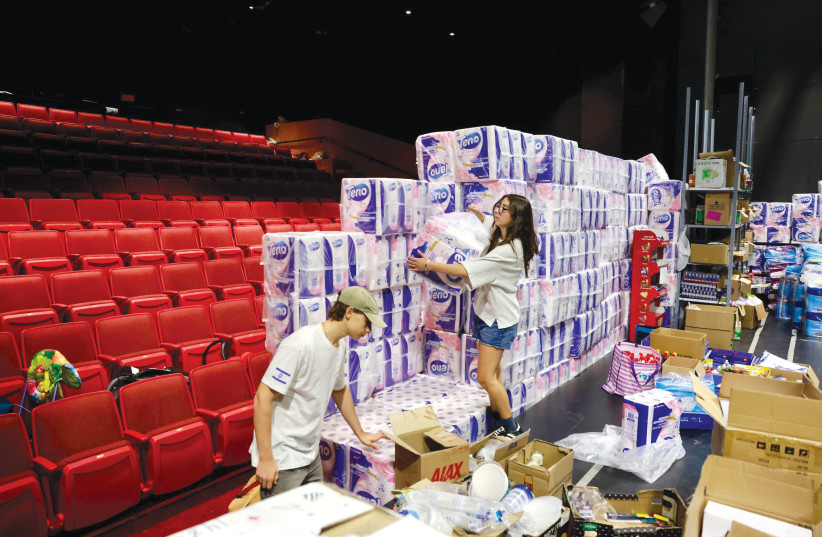On October 7, the day of the Hamas massacre, as on quite a few other occasions, the people of Jerusalem were the first to respond to the situation.
Aside from the preparations in the municipality’s Situation Room, which has many skilled teams, a separate organization led by young people, mainly students whose school year has not started, was set up. It is one of the most impressive things the city has seen for many years.
Civil society organization responding to the war
Under the leadership of the One Heart organization, which has been very active in Ukraine, a number of organizations have joined together to establish a center that provides a wide range of free and accessible support for all. These include students, Jerusalem Ihud members (who are running for city council but due to the war, all their political activity is frozen), Hitorerut, and other organizations.
The initiative is being run from the building used by the Nissan Nativ studio in the Menorah complex in the center of the city – with the understanding that this emergency operation will address the specific needs of the people in Jerusalem at this critical time, which may otherwise be overlooked by the municipality.
The organization of the place is unlike anything that has gone before: “Our first goal was not to bring boxes with items that we think are necessary but to invite the people to come and choose for themselves – as they would have done if they had gone shopping in normal times,” explains Sharon Gini, who is responsible, among other things, for the clothing sector at the center.

The first floor, a wide, bright hall, entirely surrounded by large glass windows, was designed and planned by Bezalel students from the architecture and fashion design departments.
“There is an area for women’s and men’s clothes, an area for children’s clothes, shoes, and baby clothes – everything is arranged nicely and carefully as if it were a normal store.”
On this floor, clothes and shoes are displayed for residents and evacuees, many of whom arrive in Jerusalem without anything from the bombed-out southern settlements. “But upstairs on the fourth floor, we have a huge warehouse full of goods,” emphasizes Gini. At the moment, clothes are no longer needed, although children’s books and toys are in short supply, she says.
“We had to learn to adapt to the people who came here on their own initiative or were sent by the welfare services. There is a large religious and even ultra-Orthodox population among the refugees from the South. We had to act with the required sensitivity to adapt the clothes, as well as the books and toys, because our goal is to help and not offend anyone,” explains Elad Shpiltnik, a fifth-year architecture student at Bezalel, who is waiting for the school year to start (it has already been postponed twice). However, he adds, these people are also exposed to the very special atmosphere of Jerusalem, where haredi, religious, and secular can, and do, work and live together.
THE BUILDING is used by the Nissan Nativ school during normal times. The planning and division of the work being done there now in the various fields is shared among volunteers in the different schools in the complex.
On the upper floors, the teams work incredibly hard. “The soldiers come with their cellphones and their computers, sit down, and start working,” explains Adir Schwartz from the Hitorerut movement, who is part of the team.
“There is a team that works with residents who have vacated independently; that is, they are not entitled to a hotel according to the law, but they prefer to stay away from the southern region. We give them various options – either an inexpensive hotel and then connect them with donors to finance it, or connect them with residents who are willing to host them.
“There are also those who obtain empty apartments from non-residents who are willing to make their apartments available for the benefit of the evacuees. The extent of the generosity, the willingness to help, and the openness are unfathomable.
“There is a special team that deals with these issues in different languages. There are people here who speak English, Spanish, Russian, French, and Amharic, as well as Arabic. There are also Arab residents from the South who are a little afraid to be exposed but definitely need assistance as well. We try to help everyone,” continues Shpiltnik.
The team works in conjunction with the municipality to ensure that welfare services and psychological assistance are available for those who need them: “Basically, there is a representative of ours in every hotel to which the residents of the South were evacuated. He works with the representative of the municipality, and together they address the needs of each individual. We are here to listen to them and to do the best we can to give them support and hope.”
Non-student volunteers also help at the center. They include Ya’ala de Lange and Laura Wharton, as well as Deputy Mayor Fleur Hassan-Nahum, who helped to pack boxes of essential supplies at the Lev Echad operation room. Dalia al-Aqidi, who is running for Congress in Minnesota’s 5th congressional district with the hope of beating Congresswoman Ilhan Omar, also showed her unwavering support for Israel by traveling from America to help. ❖
